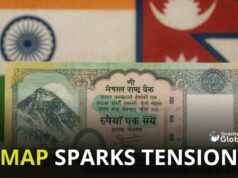For anyone interested in Nepal, All Roads Lead North: Nepal’s Turn to China by Amish Raj Mulmi is a must read. A first time author, Mulmi has written a dense yet deeply engaging book on Nepal’s relationship with Tibet and China. In this conversation on Books Corner with StratNews Global’s Surya Gangadharan, Mulmi underscores that India is not the subject here although it appears through much of this work. But for those convinced of the immutability of the India-Nepal “roti-beti ka rishta”, here’s an eye-opener. Nepal has had a similar relationship with Tibet for many centuries, sundered only by China’s occupation of the plateau.
So this book is about the many facets of that relationship including and especially the Newar community that traded with Tibet. They enjoyed extraterritorial rights there, married local women and like all successful communities, had their share of adversaries. Mulmi also explores the Tibet-China relationship, how an army sent by the Qing emperor in the late 18th century into Nepal to check Gurkha forays into Tibet, resulted in the defeat of that very army.
Mulmi devotes an entire chapter Between Two Boulders, on Nepal’s predicament, a tiny country squeezed between two giants China in the north and India in the south, and the Kathmandu elite’s need to play off one against the other “for the best deal”. In the process, it would appear that Nepal has tilted more towards China, a legacy of India’s economic blockades that embittered large sections of the population. The question is whether in playing up to China, Nepal’s politicians know and understand what they are dealing with.
China’s ambitions in Nepal centre on the need to ensure it does not become a hotbed of Tibetan dissident activity. Also, entry into Nepal, the Chinese believe, could sometime in the future help gain access to the Indian market next door. The former is already visible, the latter seems doubtful given deepening distrust amid rising tension. But as Nepal draws closer to China, this could impact the free movement of people across the border with India. Signs are already evident of greater scrutiny of Nepali nationals entering India through the land borders.
More in this conversation with Amish Raj Mulmi.




